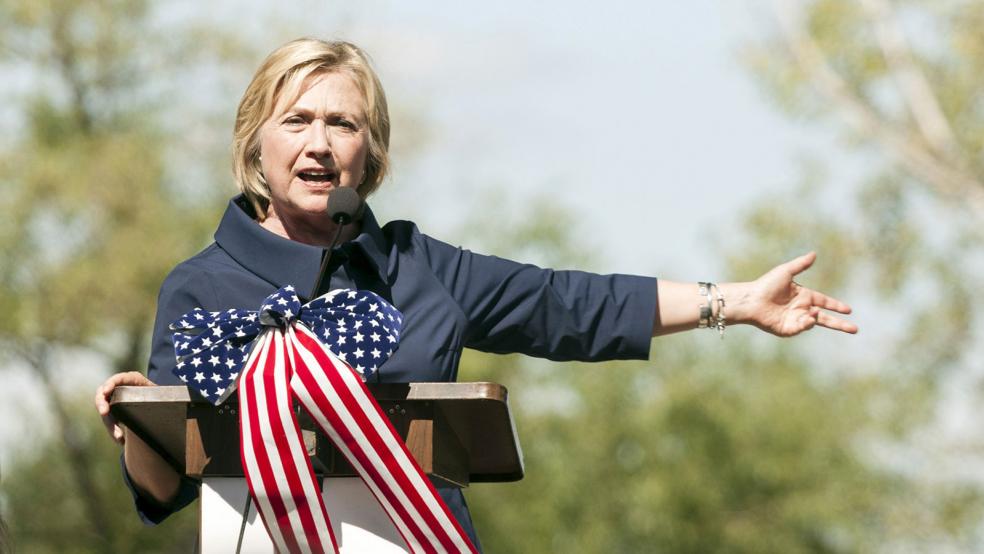Eight years ago, the former First Lady and then-Senator emerged from a bruising primary debate season and headed into the Iowa caucuses trailing the Senate backbencher. Barack Obama shocked the Democratic establishment by successfully running to Clinton’s left. Today, Clinton once again finds herself heading into the Iowa caucuses trailing a Senate backbencher who has outflanked her with progressives.
Two recent polls show Bernie Sanders, the Socialist Senator from Vermont, passing the presumed frontrunner in the Democratic Party’s first primary test. Quinnipiac, a well-respected independent polling organization, gave Sanders a five-point lead among likely voters in Iowa where Clinton has consistently led for months – and until recently, by a wide margin. Less than a month ago, Clinton had a double-digit 52.7/35 lead over Sanders in the Real Clear Politics average in the state; now it has dropped to a 0.2 percent lead, with Sanders surging just as the caucuses approach.
Related: Hillary Clinton Gets a Taste of What Could Be a Painful 2016
It’s not just Iowa, either. Unlike in Iowa, Sanders has been competitive with Clinton in New Hampshire since mid-October. Sanders has led the RCP average in the Granite State since early December. Two polls in January from Fox and Monmouth put Sanders up by double digits over Clinton, leaving her with the potential embarrassment of losing the first two contests to an opponent who spent most of his life refusing to consider himself a member of the same party.
If that sounds familiar, it should. Republican candidates are facing the same kind of frustration over the spectacular rise and surprising staying power of Donald Trump, a man who backed Hillary Clinton in the 2008 cycle and contributed to her campaign. In the GOP, though, Trump has the advantage of facing a multitude of candidates, allowing him to dominate while garnering less than a third of overall Republican primary voters. Clinton has no such excuse; Sanders has overtaken her in essentially a two-person race.
The conventional wisdom now on the Democratic primary race sounds much like it did eight years ago, too. Even with Sanders surging and Clinton faltering, analysts still believe that the establishment edge will be too tough for Sanders to overcome. Sanders may be resonating with young voters and on social media, but his political philosophy is too far out of the mainstream to win. That establishment edge didn’t work out for Clinton in 2008 – in fact, it became a millstone around her neck in the end for an electorate looking for change.
Related: Clinton Facing a Long Fight as Sanders’ Fundraising Soars
Ironically, after seven-plus years of Obama, the Democratic base is still looking for change, although they seem to be finding it in a much different form. Rather than look for change in the form of a young and fresh face in national politics, this time they’re choosing someone even older than Clinton, a man who arrived in Washington two years before the Clintons as Vermont’s at-large Congressman.
Clinton claims to be “not nervous at all” about Sanders’s rise in the polls. “I’m excited about where we are,” she told NBC’s Savannah Guthrie on Wednesday. That is either false bravado or outright denial, the Washington Post’s Chris Cillizza writes.
“There are warning signs almost everywhere she looks that suggest that the Vermont socialist is gaining momentum at exactly the worst moment for Clinton's chances at winning the nomination,” he explains. “[L]osing Iowa and New Hampshire, which now seems possible if not likely, is a nightmare scenario for Clinton,” Cillizza concludes. “And one that should make her very nervous.”
Related: Democrat Clinton Raises $55 Million in Fourth Quarter: Campaign
There may be other reasons for Clinton to worry. Over the last few months, Barack Obama had put gun control at the top of his priority list, a rare topic on which Sanders may be vulnerable with the progressive grassroots. As a Senator representing Vermont, where gun rights are prized, Sanders has walked a fine line.
Sensing the lead slipping away, Clinton has hit Sanders hard recently on gun issues in ads running in both Iowa and New Hampshire. However, Obama largely punted on his threats to use “executive actions” to force gun control, and offered one generic mention of “gun violence” in his final State of the Union address. The lack of cover from Obama may well undermine the effectiveness of this attack.
At the same time, Obama shifted his focus in the address to Congress on issues much more closely associated with Sanders, such as income inequality and keeping “big banks or Big Oil or hedge funds” from writing the rules. Sanders has used the same warnings to hit Clinton over her ties to Wall Street and corporate interests. Joe Biden jumped into the fray as well, expressing his daily regret over not running for the nomination himself – and then noting that Sanders had more “authenticity” on these issues than Clinton.
With new and damaging revelations coming from the e-mail scandal this month and the Democratic Party establishment perhaps turning on her, Hillary Clinton suddenly looks not just vulnerable, but perhaps destined to lose again. She shouldn’t be nervous, as Cillizza advises. To borrow a line from Geena Davis from The Fly, “Be afraid – be very afraid.” On the eve of Iowa, the second coronation looks ready to turn into another usurpation.






